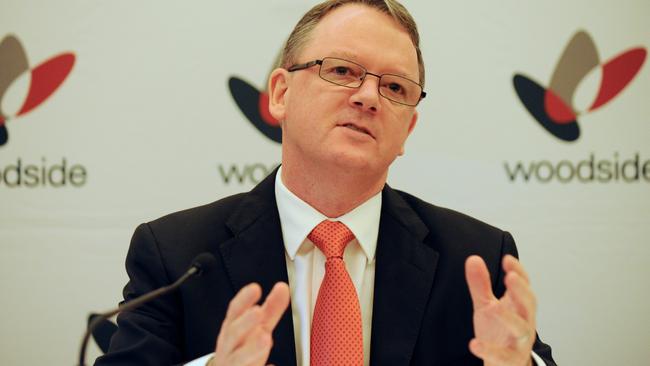Royal Dutch Shell sells off most of stake in WA-based oil and gas giant Woodside Petroleum
WOODSIDE will spend nearly $3b after Shell announced it would sell most of its stake in the WA-based oil and gas giant.

Mining
Don't miss out on the headlines from Mining. Followed categories will be added to My News.
AUSTRALIA’S largest oil and gas company Woodside Petroleum will spend nearly $3 billion to get Royal Dutch Shell off its share register.
Woodside’s largest shareholder, petroleum giant Shell announced plans today to sell 19 per cent of its $6.3 billion stake.
The desire to split is mutual, with Woodside keen to remove the overhang that has capped its share price for years and Shell in the middle of a $15 billion global asset sale, including Australian refineries and service stations.
Former treasurer Peter Costello blocked Shell’s attempted $10 billion takeover of Woodside in 2001 on national interest grounds — one of only two such rejections in Australian history.
Woodside will buy back 78.3 million of its shares — or 9.5 per cent of the company — from Shell for $US2.68 billion ($A2.90 billion) or $A36.49 a share, if shareholders back the deal.
Another 78.3 million shares will be sold to institutional investors at $A41.35 per share.
Shell will be left with a 4.5 per cent stake.
Its chief executive Ben van Beurden said it would net $US5 billion ($A5.41 billion) from the deal.
Woodside, which operates six of Australia’s seven LNG processing plants predominantly in WA, described it as a new chapter.
It was a natural transition in the evolution of the company, Woodside chief executive Peter Coleman told an investor briefing.
“It is the first time in many, many years we have not had a substantial shareholder on the register,” he said.
“We now look very much like most of our peers in the marketplace.
“I think that it is a really good thing, the market will be able to fully value us, we will get full value on our ASX listing with respect to our weighting on the index as well.”
Shell had increasingly flagged its desire to sell over the years, reducing the incentive for other institutional investors to buy in until that happened, Royal Bank of Canada analyst Andrew Williams said.
“Who knows if the stock may have been at current share price levels earlier if that overhang had been removed,” he said.
Shell reduced its stake by 10 per cent for $A42.23 a share in 2010, well above Tuesday’s sale prices.
Woodside’s shares are in a halt and last traded at $42.85.
Woodside will cancel the 9.5 stake it is buying back, delivering real value to shareholders through enhanced earnings per share, cash flow and dividends, Mr Coleman said.
It can afford to do that, he said, through existing cash and debt, low gearing and last month’s collapse of its planned $US2.6 billion ($A2.81 billion) share in the Israeli Leviathan gas project, freeing up capital.
Woodside could now be vulnerable to a takeover, although Mr Coleman said that was not part of the company’s plans.
Mr Williams said the market remained concerned about Woodside’s growth prospects, given the uncertainty around what new proposed projects would emerge to replace their North West Shelf and Pluto projects that would eventually decline.
Originally published as Royal Dutch Shell sells off most of stake in WA-based oil and gas giant Woodside Petroleum


